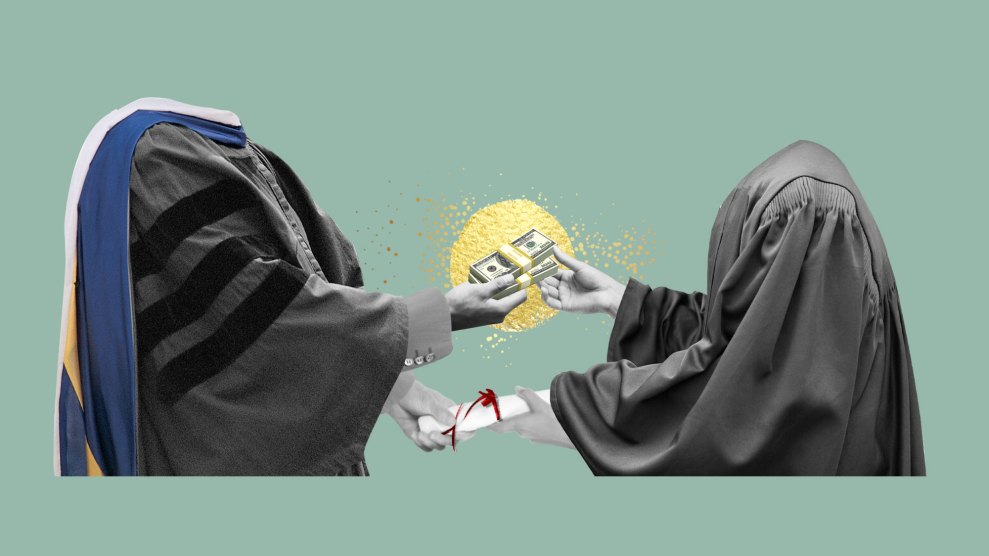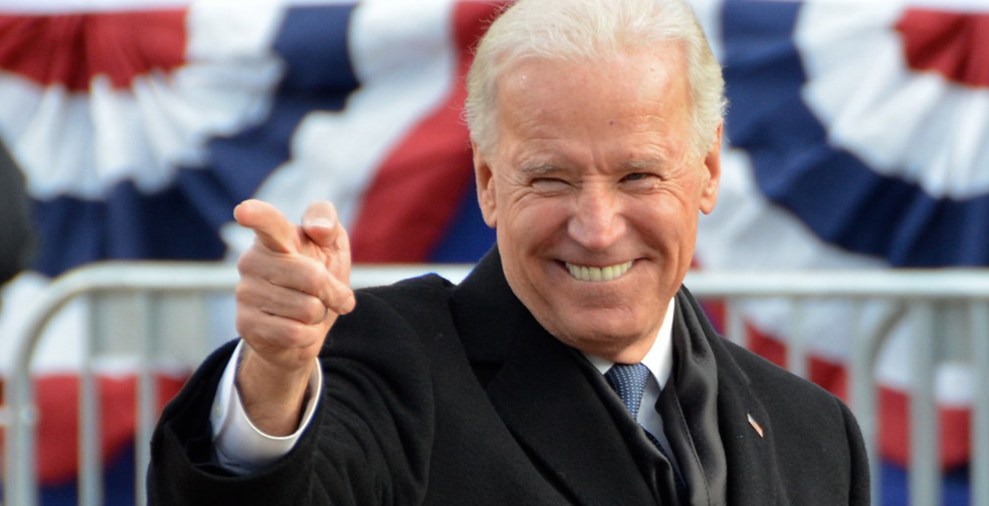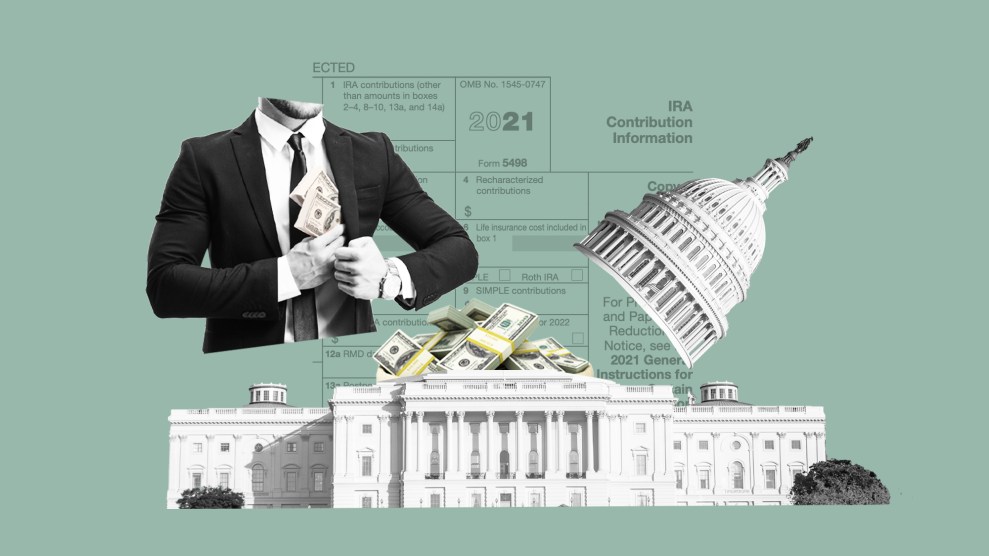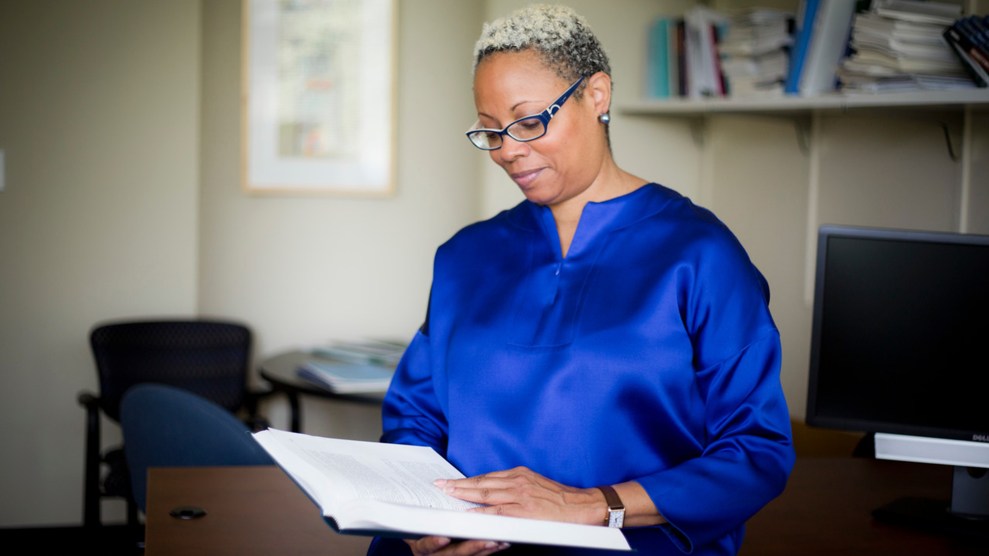
Mother Jones illustration; Getty
The first trial of the Operation Varsity Blues scandal—wherein dozens of wealthy and prominent Americans were indicted for allegedly cheating and bribing their offspring into elite universities—wrapped up this week. The fates of two defendants, John Wilson, a private equity executive, and Gamal Abdelaziz, a former casino big shot, were handed over to a jury, which promptly found them guilty. Defense lawyers had suggested these two rich, hapless clients did nothing wrong besides playing a game everyone knows is rigged in favor of students from wealthy families. Abdelaziz and Wilson claimed they’d been led to believe they were making legitimate donations to the institutions in question. They were just victims!
Only in a nation with such egregious disparities in higher education might a jury even consider such an argument. Indeed, whenever a scandal erupts wherein the greedy rich are seen as participating in criminal acts to maintain their privilege, status, and wealth, it is invariably accompanied by a sub-scandal acknowledging what the wealthy can get away with every day without breaking the law.
To the degree upward mobility exists in the United States, it hinges on higher education. The financial payoff of a college degree is indisputable. As of mid-2020, Americans 25 and older with a bachelor’s degree or better earned median pay 80 percent higher than those with just a high school diploma. The earnings bump is considerably larger for graduates of Ivy League and “Ivy-Plus” schools—the traditional Ivies plus the University of Chicago, Duke, MIT, and Stanford. These colleges tend to be the most efficient mobility engines, according to a 2017 study from the National Bureau of Economic Research. But to catch that train, a student has to get in and through.
That’s where the rich enjoy a huge advantage. The Ivy-Pluses, the same researchers found, enrolled more students from top-earning 1 percent families than from the entire bottom 50 percent. What’s more, children of 1 percenters were 77 times more likely than the children of bottom quintile families to attend an Ivy-Plus college.
The sources of these shocking stats range from differences in parental spending during early childhood to the ability of affluent parents to pay for high-end prep schools, enrichment activities, private tutors, SAT coaches, and college counselors. The disparities also have to do with college affordability, a proliferation of student debt, and the fact that the rules governing federally subsidized college savings accounts favor wealthy families.
Then there’s the legacy system. A 2018 survey of admissions directors by Inside Higher Ed found that 42 percent of private colleges and 6 percent of public ones gave an admissions boost to children of alumni and sometimes to grandchildren and siblings, too. A handful of top institutions have rejected this tradition but many cling to it jealously, including most of the Ivy-Pluses and schools like Notre Dame, the University of Virginia, and the University of Southern California, which calls its legacies “scions.”
The first-year classes at legacy schools typically consist of 10 percent to 20 percent descendants of alumni—rivaling and sometimes exceeding the enrollment of underrepresented racial groups. A survey of Harvard’s class of 2019 by the school paper, the Crimson, found that 28 percent of incoming first-years had one or more alumni relatives, and nearly 17 percent had at least one alumni parent. More than two-thirds of the direct legacies reported that their families earned at least $250,000 a year, and 43 percent said their parents earned at least $500,000.
For the classes of 2000 through 2019, Harvard’s average legacy acceptance rate was about 34 percent, compared with 6 percent for non-legacies, according to an analysis commissioned by the anti-affirmative-action group that sued Harvard, claiming it discriminates against students of Asian descent. (The group lost its case but has appealed to the Supreme Court.) At Stanford, the legacy admissions rate has been about three times the nonlegacy rate.
The legacy system has nothing to do with merit, of course, and everything to do with the fact that legacies and their families are viewed as likely donors. In his book The Price of Admission, the Pulitzer Prize–winning journalist and author Daniel Golden notes that elite private colleges, as a condition of their tax-exempt status, are prohibited from engaging in racial discrimination, yet the legacies who suck up slots at the expense of other qualified students are overwhelmingly wealthy and white.
If parents can afford to fund construction of, say, a new building wing, that would further boost their children’s chances of getting in. Children of major donors often end up on the dean’s or director’s “interest list.” This is better than being a legacy. The analysis commissioned by the group suing Harvard found that 42 percent of kids on the dean’s list got accepted—seven times the normal acceptance rate.
While researching his book, Golden learned that the New Jersey real estate mogul Charles Kushner had pledged $2.5 million to Harvard, payable in $250,000 annual installments, around the time his son Jared was applying. “His GPA did not warrant it, his SAT scores did not warrant it,” a former official at the younger Kushner’s private high school told Golden. “We thought for sure there was no way this was going to happen.”
But Jared was accepted, graduated from Harvard in 2003, and ended up working for his father-in-law in the White House. The elder Kushner’s gift was tax-deductible. “Is that really a gift?” Golden asked Vogue rhetorically. “Or is that a purchase of a good or service?”
The situation is no different for ultra-rich liberals. A well-to-do friend whose daughter attended Cornell told me he finds the legacy system appalling, but the school’s alumni come up with all kinds of ways to rationalize it. As I did research for my own book, in fact, a wealthy source told me that if a billionaire is willing to donate a building to get his kid into a top college, he didn’t have a problem with that. Didn’t the utility of having that building for the benefit of all the students, rich and poor, more than make up for the inequity?
There’s a logic to that argument, but try telling it to the lower-income kid who sacrificed their childhood in pursuit of an Ivy League education, only to lose out to a less-qualified rich kid. An elite education, after all, can do wonders in lifting a family out of poverty. The above-mentioned NBER study—authored by Raj Chetty, Emmanuel Saez, and other notable economists—found that the poorest students attending the nation’s 82 most selective colleges (based on Barron’s ratings) ended up only 7 percentiles behind the richest ones in postgraduate earnings. What’s more, 60 percent of Ivy-Plus students from families in the bottom 20 percent of the income distribution ended up in the top 20 percent of earners after they graduated. The Ivy-Pluses were also the most likely to propel bottom-quintile students into the top 1 percent.
This is not to say that legacy students are slackers. Most had access to highly educated parents and a top-notch primary and secondary education. With the exception perhaps of talented athletes and kids whose parents can afford to buy a building, any applicant who can’t pass muster on grades and test scores will be hard-pressed to gain entrance to a top university, legacy or not.
So what’s a wealthy parent to do when their child fails to live up to their expectations? They have three choices, basically. They can accept reality and help the kid find a decent job. They can send the kid to a perfectly respectable state school or community college. Or they can go nuclear: They can cheat.
One could argue convincingly that legacy admissions and dean’s interest lists are cheating, too. But as the Operation Varsity Blues prosecutors like to emphasize, those things are legal. The services offered by Confidential Witness No. 1 decidedly were not.
CW-1, as the court documents refer to him, is William “Rick” Singer, the disgraced ex–basketball coach and college adviser whose Southern California companies were ground zero in the Operation Varsity Blues scandal. Golden notes in the latest edition of his book that Singer was notorious in college counseling circles long before the feds indicted him for rigging standardized tests and bribing athletic officials coaches to get rich people’s children into elite schools on phony athletic scholarships.
Singer was known to colleagues in the college advising industry as a guy who cut corners, who tried to pass white students off as underrepresented minorities and fabricated extracurriculars on their paperwork. One independent college counselor told Golden about a mother she knew who had hired Singer and was surprised to subsequently learn from her son’s application that he “had established a fantasy football league, marketed an international blog on social responsibility, written several short films for television, spoke Spanish at home, ranked as a top-50 junior tennis player and coordinated the basketball program at the Helen Keller Park”—which didn’t exist. She stopped working with Singer and made her son strip these lies from his application.
But Singer found plenty of willing clients as word of his services spread within elite circles. Desperate Housewives star Felicity Huffman reportedly learned of Singer from a friend. He was recommended to Douglas Hodge, then CEO of PIMCO, a mutual funds company, by a fellow executive. Elizabeth Henriquez, the wife of Hercules Capital founder Manuel Henriquez, told Davina Isackson, whose husband, Bruce, is a real estate developer. And somehow, according to the Wall Street Journal, Singer even ended up on Morgan Stanley’s referral list.
Keenly attuned to the anxieties around college admissions, Singer exploited parents’ desperation and willingness to cheat for personal gain. From 2011 to 2018, he collected more than $25 million to facilitate his schemes. After the FBI finally caught up to him, he turned state’s witness and cooperated with federal prosecutors in the hope of receiving lenient treatment. The resulting stings ensnared prominent clients from business, entertainment, fashion, finance, hospitality, law, medicine, and real estate. Of the 53 people indicted, 17 were coaches, athletic officials, and others Singer paid or bribed. Most of the rest were parents.
The first parent to plead guilty was Huffman, who, along with her husband, Shameless star William Macy, who wasn’t charged, paid $15,000 to have Singer rig their older daughter’s SAT scores. The daughter got a 1420 on the test and Huffman got off with a one-month prison sentence—of which she served two weeks. The next to plead guilty was Gordon Caplan, an attorney from upscale Greenwich, Connecticut, who co-chaired the white-shoe New York law firm Willkie Farr & Gallagher.
As Singer described his services in a June 2018 phone call, Caplan was unaware that federal agents were listening in. “What we do,” Singer explained, according to the criminal complaint, “is we help the wealthiest families in the US get their kids into school.”
Caplan had attended Cornell as an undergrad, so his daughter would be a legacy. But even with that advantage, he wasn’t sure she had what it would take to get in. “There is a front door, which means you get in on your own,” Singer said. “The back door is through institutional advancement, which is 10 times as much money. And I’ve created this side door in.” Even the back door wasn’t a sure thing, Singer emphasized, but he claimed he’d already slipped 761 families in through the side door. “Everybody’s got a friend of a friend who knows somebody, but there’s no guarantee. They’re just gonna give you a second look. My families want a guarantee.”
If Caplan went with Singer’s plan, the first step would be to have his daughter undergo a battery of neuropsychological tests. Singer’s handpicked psychologist would diagnose her with a “learning difference” that would get her special accommodations for taking the SAT or ACT tests then required by most colleges. For the scheme to work, they would have to convince an independent testing committee to grant his daughter double time over multiple days. Sometimes you had to appeal this committee’s decision, Singer said. The psychologist would handle that if need be.
The fact that Caplan’s daughter was doing high school online was fortuitous. Students normally take the admissions tests at their schools, Singer said, but since she had no physical school, that would make it easier for Caplan to fly her out to Los Angeles to test at one of the two centers Singer “owned.” They would pass it off as a college recruiting trip, Singer said—he’d even had some clients who claimed they were attending an out-of-town bar mitzvah.
Rigging the test would cost Caplan $75,000. In exchange, Singer would guarantee his daughter an ACT score in the 30s (out of 36) or an SAT score in the 1400s (out of 1600). A proctor on Singer’s payroll—“He lives in Florida. He actually played tennis at Harvard”—would administer the exam and correct her answers after she left. The girl would never know. She would think she’d done it by her own merit. “Which is great, that’s the way you want it. They feel good about themselves,” Singer said.
Caplan didn’t commit right away, according to the government, but in a follow-up call, he told Singer he found the whole notion “pretty interesting.”
“It’s the home run of home runs!” Singer said.
“And it works?” Caplan asked.
“Every time,” Singer replied. Both men laughed.
The neuropsych testing would cost an additional four or five grand, and there would be a ton of paperwork to fill out, Singer said, but “here’s the great thing. When she goes to college, she gets to bring this report with her and she’ll get extended time in all those things in whatever school she goes to.”
Caplan, in the meantime, should instruct his daughter “to be stupid” for the psychologist. “The goal is to be slow, to be not as bright,” Singer told him. All the wealthy families had figured this out, he claimed. “Most of these kids don’t even have issues, but they’re getting time. The playing field is not fair.”
“No, it’s not,” Caplan replied. “I mean this is, to be honest, it feels a little weird.”
“I know it does,” Singer reassured him, chuckling. “But when she gets the score and we have choices, you’re gonna be saying, ‘Okay, I’ll take all my kids—we’re gonna do the same thing.’”
“Yeah,” Caplan says. “I will.” He wasn’t worried about the moral issue, he said. “I’m worried about the—if she’s caught doing that, you know, she’s finished.”
Sixteen months later, in October 2019, Caplan stood before a federal judge awaiting his sentence. He appeared stricken, according to observers. He had pleaded guilty to conspiracy and mail fraud, and prosecutors were recommending eight months in prison. The judge sentenced him to one month, plus one year of supervised release, 250 hours of community service, and a $50,000 fine.
Caplan didn’t speak to the reporters present, but he issued a statement: “The remorse and shame that I feel is more than I can convey. I apologize not only to my family, friends, colleagues and the legal bar, but also to students everywhere who have been accepted to college through their own hard work.” His reputation was in tatters. He’d lost his job at the fancy law firm and had been suspended, at least temporarily, from practicing law in New York State. He also faced permanent disbarment, which he planned to appeal. And, of course, he was on his way to prison. But his biggest regret was betraying his child, who “has been devastated to learn what I did and has been hurt the most by it.”
More guilty pleas and mea culpas were forthcoming. Bruce and Davina Isackson had paid Singer $600,000 to get their daughters into USC and UCLA with rigged test scores and bogus athletic credentials: “Our duty as parents was to set a good example for our children and instead we have harmed and embarrassed them by our misguided decisions,” they said in a statement.
Huffman wrote that she would bear the shame of her transgression for life. She apologized in particular to all the students who worked hard to get into college, and to their parents, “who make tremendous sacrifices to support their children and do so honestly.”
Only a handful of parents ultimately decided to risk a federal trial—by late 2020, 29 had entered guilty pleas. “Far and away the most culpable,” prosecutors said, were Hot Pockets heir Michelle Janavs, Elizabeth and Manuel Henriquez, and PIMCO’s Doug Hodge, who’d come back to Singer again and again. Hodge paid huge bribes, the government said, including $325,000 to a Georgetown coach to get two of his kids admitted as tennis recruits and $525,000 to get two more of his kids into USC for soccer and football. (None were qualified.) Some parents, like Caplan, had engaged in schemes to rig their children’s ACTs or SATs, complete with bogus psychological testing to earn the kids special accommodations. These parents embarked on their vile deeds, the prosecutors said, “from perches at the apex of money and power,” where they lived lives of “extreme, almost unfathomable privilege.”
Janavs was sentenced to five months in prison. Elizabeth Henriquez got seven. Hodge got nine. At his sentencing, he told the judge he felt “the deepest remorse.” But “I do not believe that ego or desire for higher social status drove my decision-making. Rather, I was driven by my own transformative educational experiences and my deep parental love.”
If there’s a moral to any of this, perhaps it is that cheating so your kids can win a game already rigged in their favor is not a win at all—for you, them, or anyone, for that matter. What’s more, there is such a thing as loving your children too much.
Portions of this article were excerpted from Jackpot: How the Super-Rich Really Live—and How Their Wealth Harms Us All. (Copyright 2021 by Michael Mechanic; reprinted with permission from Simon & Schuster.)
This article was updated to reflect the guilty verdict announced on October 8.









